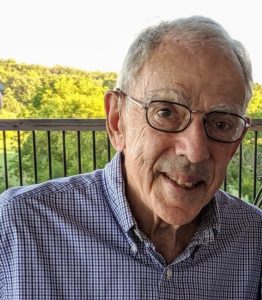Essayistic Journals
Klaus’s essayistic journals include the following works, which take account not only of his life and marriage, his gardening and cooking, his retirement and aging, but also his abiding concern with time, change and mortality:
My Vegetable Love: a daily 9-month journal from seedtime to harvest, each entry a vividly detailed 500-word essay telling about an incident in Klaus’s garden and in his ongoing life. [More]
Weathering Winter: a daily journal from the first cold snap of late-December to the first outdoor planting in mid-March, telling how Klaus deals with the harsh climate and chilly truths of winter. [More]
Taking Retirement: a 7-month diary telling how Klaus deals with the challenges of creating a new life after a long professional career, featuring lively give-and-take with his witty wife Kate. [More]
Letters to Kate: a year’s collection of Klaus’s letters to his wife after her sudden death from a cerebral hemorrhage, telling of his anguish, his memories of her, their life together, and a life after life. [More]
The Ninth Decade: an 8-year chronicle in 6-month essays, about Klaus’s life from the early-to late-80s, featuring his longtime companion Jackie, bearing witness to the challenges and pleasures of a longer-than-average lifespan. [More]
-

Welcome
Essayistic Role-Playing
Klaus’s discussion of impersonation and role-playing in essays and other kinds of nonfiction can be found not only in his books about it but also throughout the Supplements page.
The Made-Up Self: a collection of 10 essays in which Klaus shows how the “person” is a personal essay is a character, a persona, arising from carefully chosen words, memories, and thoughts. [More]
A Self Made of Words: a brief craft book, in which Klaus discusses and illustrates how 14 elements of writing can be used to create distinctive personas in nonfiction writing. [More]
-
Copyright © Carl Klaus
-
Site Design: IowaCityWeb.com
Proudly powered by WordPress.
Theme: Coraline by WordPress.com.

Getting Personal, by Susan Olding, LA Review of Books, September 23, 2011
“That the essayist’s persona is as constructed as any other author’s ought to be obvious. But until Carl Klaus, few seemed aware of it. In The Made-Up Self: Impersonation in the Personal Essay, Klaus, founder of Iowa’s nonfiction program and Professor Emeritus there, brings many decades of deliberation to a subject that until now has almost escaped observation. What makes his book uniquely rewarding is his double perspective. Klaus has studied and taught the essay, but he is also a practitioner of the form. In The Made-Up Self he brings the academic’s critical intelligence together with the essayist’s graceful prose in a fascinating and multi-faceted exploration of the genre that David Shields calls the “theater of the brain.”